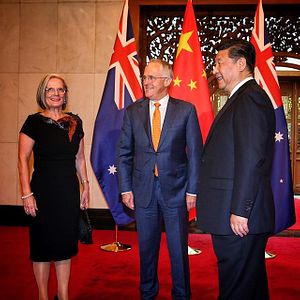In its newly published Foreign Policy White Paper, Australia took a strong stance on the South China Sea issue, urging both China and the Philippines to follow the Permanent Court of Arbitration’s July 2016 ruling. In response, both the Chinese defense ministry and Chinese foreign ministry criticized Australia for its “ irresponsible remarks.”
Australia’s recent White Paper, the first one issued since the Howard government’s Foreign Policy White Paper in 2003, laid out the vision for its foreign relations over the next decade.
Taking a close look at China’s rise, the White Paper claimed that “China is challenging America’s position” and “China’s power and influence are growing to match, and in some cases exceed, that of the United States. ”
The White Paper expressed concerns over China’s growing power, which changes the region “in ways without precedent in Australia’s modern history.” Particularly on the South China Sea issue, the White Paper singled China out and opposed the use of
disputed features and artificial structures in the South China Sea for military purposes. Additionally, it reaffirms its position that “the Permanent Court of Arbitration’s ruling on the Philippines South China Sea Arbitration is final and binding” on both China and the Philippines.
Australia’s clear and strong stance on the South China Sea issue irritated China.
As The Diplomat has been following, since Philippine President Rodrigo Duterte took office last year, China has successfully fixed its relations with the Philippines in spite of the ruling by a tribunal of The Hague’s Permanent Court of Arbitration against China in a case brought by the previous Philippine government. In November, Chinese Premier Li Keqiang paid a state visit to the Philippines and complimented the China-Philippines relationship on becoming as warm as Manila’s weather.
Against that backdrop, Australia’s remarks on The Hague’s ruling looked like a deliberate provocation from Beijing’s perspective.
In response, at the monthly press conference on November 30, Chinese defense ministry spokesperson Wu Qian “strongly” opposed Australia for its “irresponsible comments.” He said:
Australia is not a party directly concerned to the South China Sea issue, so it is not in a position to make carping comments on the South China Sea issue.
Recently, the situation in the South China Sea has cooled down and shown the momentum of positive development, which fully demonstrates that the countries in this region have the wisdom, capability, and means to peacefully solve the disputes through direct consultations and dialogues. It has been proven by facts that interference from countries outside the region can only complicate the South China Sea issue and will be of no help to regional peace and stability.
Wu thus urged Australian to “strictly follow its promise of taking no stance on disputes on territory and sovereignty” and get rid of its “old mentality in mind while having a new Asia Pacific in sight.”
In comparison, although in line with Wu’s position, Chinese foreign ministry spokesperson Lu Kang’s response on November 23 sounded slightly softer. Lu emphasized that Australia’s remarks were “irresponsible,” since China and the ASEAN countries have “reached consensus” and the parties directly concerned have agreed to “peacefully resolve the dispute through dialogue and negotiation.”
But Lu also noted that the Australia’s White Paper “has given an overall positive evaluation of China’s development and China-Australia relations.”
The distinct wording between the Chinese defense ministry and foreign ministry gives the international community a hint on the nuanced difference within the Chinese government when it comes to foreign policy.

































